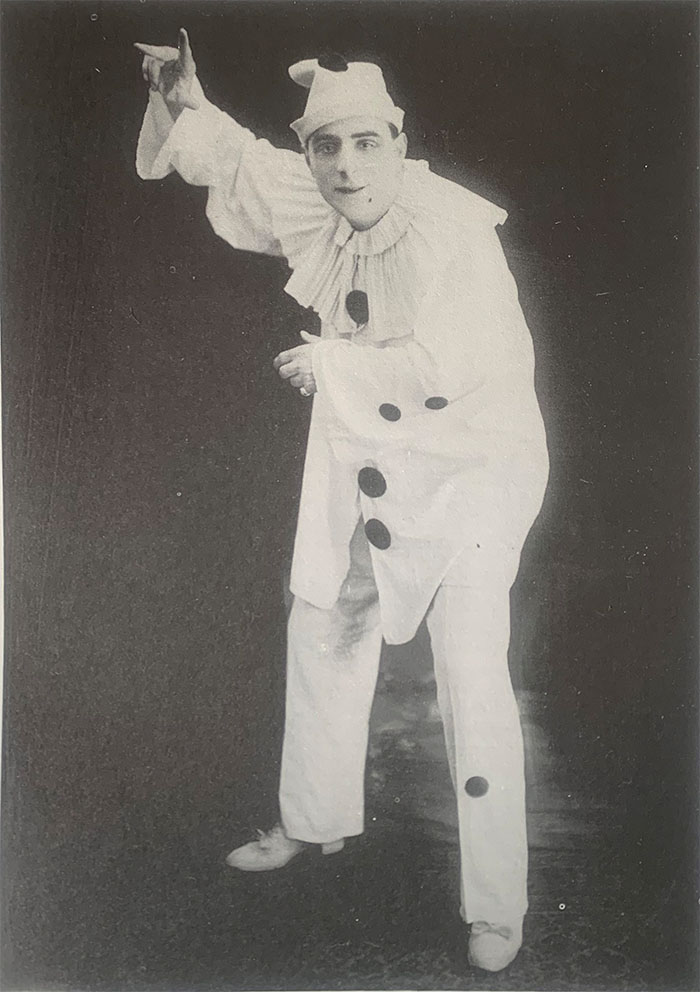About a great many singers, only the career facts are known, but nothing about the personal life. With Paolo Tuzzo, it's
the other way round: we know about him as a private person, but information about his career is so scarce that it can
make you doubt how much of a career he actually had. To a considerable extent, that's due to the fact that the primary
source about Paolo Tuzzo are the ones who he obviously wanted to escape by trying himself as a tenor: his family.
He was born into the upper class of Lecce, a regional center in the poor south Italian region of Puglia. Tuzzo's family,
however, was anything but poor, and his mother belonged to the local aristocracy. Young Tuzzo had athletic and artistic
leanings: painting, sculpture, and above all music. He played several instruments only by ear, and he sang with his
friends, among them – similar social class, similar age – Tito Schipa.
Tuzzo's father, however, had other plans for his son, and Paolo became a cavalry officer. Whenever he came home on a
leave, he proudly wore his dress regimentals, and his martial posture was conspicuous.
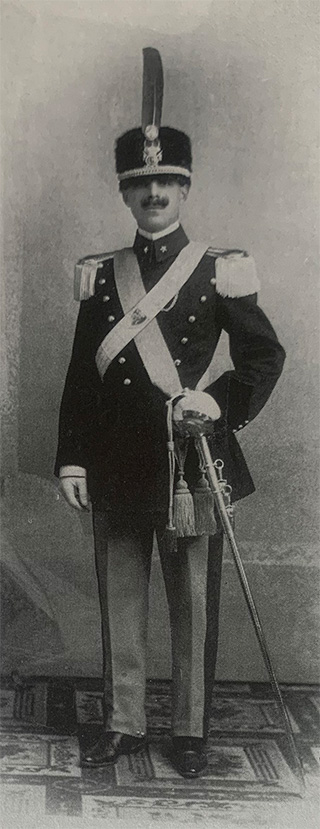
Posture or posing? One of his paintings from that period showed a brigand putting a few policemen to flight. And on 14
October 1911, Paolo Tuzzo made his tenor debut as Duca di Mantova at the small Teatro Sociale in Valenza – on the
opposite end of Italy, in Piedmont, far from home and thus from his father. It was a success. The Lecce newspaper
L'Araldo, reporting on 1 November 1911 on Tuzzo's debut in Valenza, wrote: "We learn about this with pleasure,
because we are aware of the struggle the dear young man had to endure with his family about his devotion to art. We are
convinced that in the light of this brilliant debut – certainly the start to a long and glorious career – the
young tenor's family will be satisfied to have finally given in to the artistic leanings of Paolo Tuzzo." Not so,
obviously. In late October, Tuzzo participated in an operatic concert at the Politeama in Lecce, singing "Che gelida
manina". Then he left the military; and Italy, too: he emigrated to the USA, almost instantly.
Whether or not he had ever taken voice lessons is not clear, probably because he hid every musical ambition from his
family and hence from his social environment in Lecce. Guessing from the above recording, I think he had his voice
trained, but probably not thoroughly enough. According to a (much later) Tuzzo family tradition, Tito Schipa used to say
to his friend Paolo: "If I just had your voice, and my technique..."
Tuzzo made his US debut in May 1912 in a concert at the White Eagle Hall in Jersey City. The critic of a local
Italian newspaper fell all over himself at Tuzzo's performance ("Signor Tuzzo sang like nobody ever did in this
city"), yet he remarked: "He is not a strong-voiced tenor as he arrives at the top notes but rarely, and has
to make some effort to reach them."
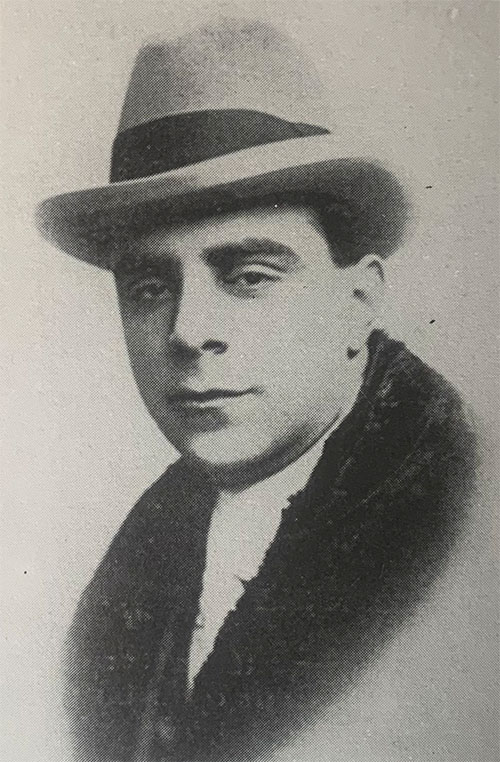
He would stay in the US for about 20 years, but what exactly he did there is not entirely clear. Of course, he sang in
public, but I'm not sure that he did regularly enough to call it a career. Newspaper reports on him are extremely scarce,
and the documents that his family kept after his death are random and certainly incomplete. In any case, he sang in
concert: already on 8 March 1914 at Carnegie Hall, together with former Met contralto Matja von Niessen-Stone, and with
conductor (and voice teacher) Clemente De Macchi on the piano. On 28 November 1915, Tuzzo gave a recital at the union of
the Professional Women's League in New York City. He sang charity concerts for widows and orphans during World War I, he
sang in Sing Sing for the prisoners. Reportedly, he appeared in concert together with Lillian Eubank and Lila Robeson of
the Metropolitan Opera troupe (they were the typical Second and Third Lady in Zauberflöte at the Met in the
1910s). In December 1920, I find Tuzzo in a vaudeville program at the Globe in Penn's Grove, New Jersey. On a visit to
Italy in 1921, he appeared once in Puglia in an aria concert – not in Lecce, though, but in Brindisi at the Teatro
Mazari. In 1922 and back in the US, he sang at cinemas in a trio with the completely obscure soprano Isla Bernhard and
the Canadian contralto (pretty obscure, too) Bertha Rogers, for instance in New Castle, Pennsylvania. On 28 April 1928,
he appeared again at Carnegie Hall.
He recorded two arias ("E lucevan le stelle" and "Vesti la giubba") for Emerson in 1917 – his only published sides,
although at least three unpublished or private recordings exist in the town archive of Campi Salentina, close to Lecce.
And as early as 1923, he sang on WCAE radio in Pittsburgh, in support of a "Music Lovers Conservatory", where he was a
vocal instructor.
In or shortly before 1925, he wrote the music and text of a few songs: "Non mi dir" (performed by Beniamino Gigli),
"Nostalgie", and a third one with the surprisingly uninspired title "Canzone", dedicated to his old friend Tito Schipa,
who performed it at a dinner that the Chicago Opera Company had organized in Schipa's honour in February 1925.
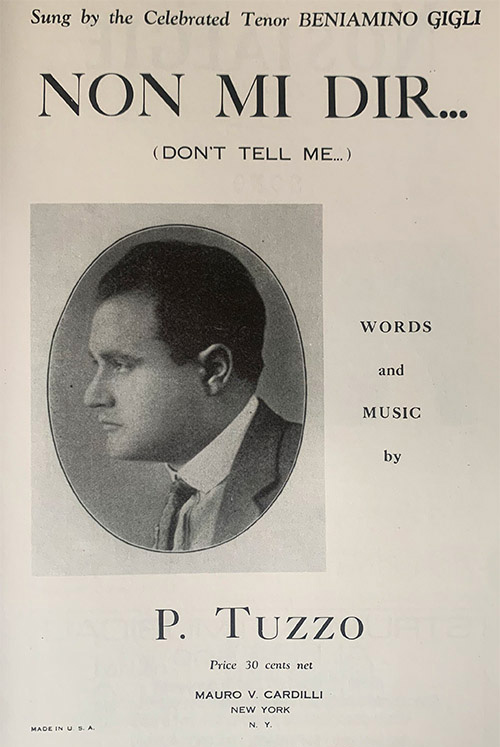
But what about staged opera? On 10 October 1918, I find him as Turiddu at Hunter College in New York City – and
that's, so far at least, his only confirmed stage appearance in the US. Of course, it's impossible to check each and
every local newspaper throughout the States, and so he may have sung more opera than just that; but it's definitely
unusual just how rarely his name appears in the press. The following year, on 7 March 1919, the director of Hunter
College's operatic department, Henry T. Fleck, wrote a letter to Tuzzo, thanking him warmly for his gentle assistance in
staging Pagliacci the evening before. Gentle assistance, that doesn't sound as if Tuzzo had sung in that
production, more as if he had helped in organizing it; on the other hand, the photo on top of this page clearly shows
Tuzzo as Canio – an actual stage costume, or just one that he donned for the photographer?
À propos of Clemente De Macchi, and à propos of the "Music Lovers Conservatory": De Macchi, it seems, had a
"Music Lovers Club", with which Tuzzo was associated. De Macchi definitely organized concerts on the East Coast; whether
or not also staged opera (and if so, whether or not with Tuzzo), I don't know. Rumour at some point had it that he was to
be engaged soon by the touring National Opera Company (another enterprise somehow linked to Clemente De Macchi) –
no idea whether that contract ever materialized. And there is a letter conversation about a contract between Tuzzo and
the Allen & Fabiani concert managers for several opera performances at the Lexington Theater in New York (about 1920);
just any newspaper review or announcement is missing, or any other proof that those performances really took place.
A preserved letter of 26 March 1922 reads (translated from Italian): "Dear Mr. Tuzzo, I beg you to visit me instantly, I
need to talk to you about your eventual engagement by the Bracale Company. I've written to Schipa so as to advise him of
the cable from Bogotà. Looking forward to meet you, I salute you. Amleto Pollastri." The Italian impresario Adolfo
Bracale toured Colombia several times between 1922 and 1933, and was important for Colombian operatic life; Amleto
Pollastri was Titta Ruffo's secretary. Unfortunately, Bracale's activities are not sufficiently documented to know
whether Tuzzo ever really sang for him in Colombia.
In an undated letter, Tito Schipa sent Tuzzo the address of the prolific film director Sidney Olcott: "Dear Paoluccio, go
and meet this gentleman whose address I'm sending, and tell him that you've been sent by me. He is the manager of
Swanson's new film, I've already talked to her about you, and have given her your photos. I've also talked to Mr. Olcott,
who is waiting for you at his studio from 10 a.m. onwards. I hope that you will succeed in something and I wish you so.
I'm enclosing three tickets for my concert. Greetings, Tito." Gloria Swanson, a famous actress at the time, worked with
Olcott on The humming bird, a 1924 and hence silent movie; Tuzzo must have craved to contribute in some other way
than as a singer. In any case, it came to nothing, and there is no mention of Tuzzo in the film credits. Of course, the
photos that Schipa gave to Swanson would suggest that Tuzzo craved to be an actor; but he may also have looked for some
organizational work: beyond the (indeterminable) "gentle assistance" provided to the 1919 Hunter College
Pagliacci, Tuzzo definitely organized something (who knows what) for the First National Institute of Violin, New
York City, which in 1929 released kind of a reference letter, calling Tuzzo a "master organizer".
Based on the information currently available, I figure Tuzzo not as much as a professional singer than as a socialite who
jobbed in the musical industry, partly but not always as a tenor.
However, in the marketing folder that Tuzzo had printed for his singing activities, he listed a number of
arias and songs for his concert programs, plus quite a few "complete operas"; so at some time and somewhere, he may
actually have sung them, although there is no evidence for it.
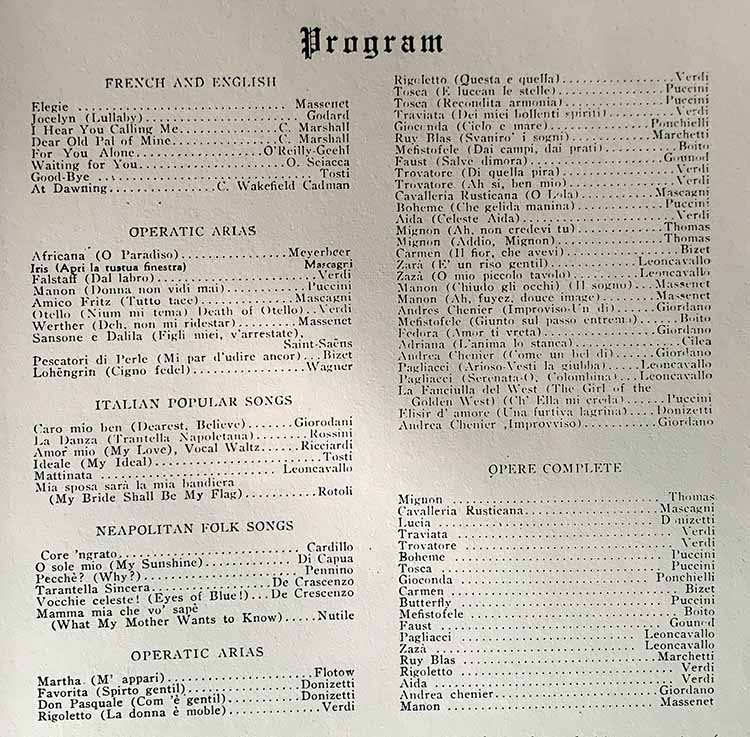 The repertory list from Tuzzo's advertising brochure
The repertory list from Tuzzo's advertising brochure
Probably caused by his insufficient vocal training, he developed a chronic laryngitis that he could not overcome; it put
a premature end to his singing ambitions.
And so he returned to Italy. It's certain that in 1932, he resided in Milano, although what he did there is not known.
Then he came back to Lecce. Whatever financial resources his family may have granted him, it wasn't sufficient for his
posh lifestyle, and he ran into debt. Then in 1937, his father died, and he inherited all his wealth. He would set out in
a carriage, visit his creditors around town and pay them all off. He was a rather eccentric figure in conservative
southern Italy: he always had his face powdered, and he wore scandalous tight pants. From 1939 to 1942, he was president
of the Unione Sportiva Lecce, the local soccer club, quite successful on a national level at the time.
Without having ever again participated in the musical life of his home town, he died in 1955 from a heart attack.
Reference 1 and source for all the pictures: Giacomo Toriano, Paolo Tuzzo. Un grande tenore leccese
sconosciuto ai leccesi, in : Lu Lampiune, August 1988; reference 2: The Penn's Grove Record, 3 December 1920; reference
3: New York Tribune, 6 October 1918; reference 4: New Castle News, 18 October 1922
I wish to thank Giacomo Toriano for providing a copy of his long-out-of-print 1988 article on Tuzzo.
